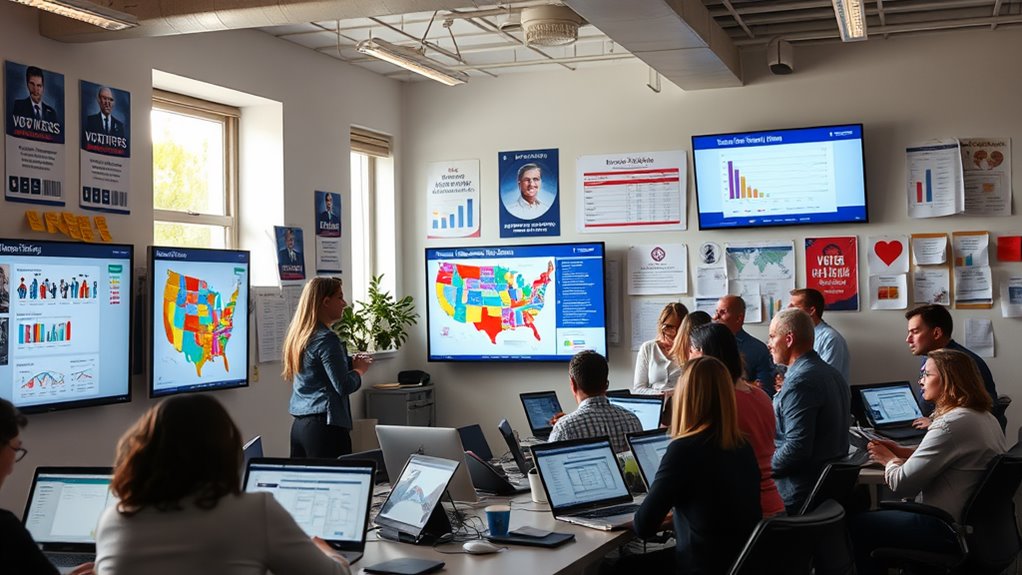Yes, you can effectively work as both a political and marketing campaign manager thanks to highly transferable skills across both fields. Modern campaign management requires expertise in digital analytics, CRM systems, and strategic communications that apply equally to political and commercial contexts. You'll use similar tools like social media management platforms, data analytics software, and A/B testing to optimize campaigns and engage audiences. With 67% of audiences now seeking information through digital channels, your ability to craft targeted messages, analyze metrics, and implement data-driven strategies will prove valuable in either sphere. The key principles of audience segmentation and performance tracking create natural bridges between these roles.
Key Takeaway
- Campaign managers can effectively bridge politics and marketing through shared skills in audience targeting, data analysis, and message positioning.
- Digital analytics expertise transfers seamlessly between political campaigns and marketing initiatives, using similar tools and metrics.
- CRM systems and database management skills are equally valuable in both political voter outreach and commercial marketing campaigns.
- Strategic communications and brand consistency principles apply similarly across political and marketing landscapes.
- Social media management and digital advertising skills are fundamental to success in both political campaigns and marketing efforts.
Modern Campaign Management Skills
Modern campaign management requires a diverse set of digital and traditional skills to navigate today's complex political landscape. You'll need to master both conventional methods and cutting-edge technologies to succeed in today's competitive environment.
Essential Modern Campaign Skills:
- Digital Analytics
- You'll track voter behavior through data management platforms
- You must interpret social media metrics and engagement rates
- Your CRM expertise will help segment supporter databases
- Strategic Communications
- You'll craft messages across multiple platforms simultaneously
- Your content needs to align with both traditional and digital media
- You must maintain consistent branding across all channels
- Technology Integration
- You'll coordinate virtual campaign events and livestreams
- Your team will utilize AI-powered voter targeting systems
- You must manage digital advertising campaigns effectively
- Resource Management
- You'll oversialize campaign budgets across various platforms
- Your fundraising efforts will incorporate digital payment systems
- You must balance traditional and online spending
To stay competitive, you'll need to update these skills continuously, as campaign technology evolves roughly every 18-24 months. Your success depends on blending time-tested campaign principles with emerging digital solutions.
Digital Tools for Electoral Success
Building on your campaign management skills requires mastering specific digital tools that drive electoral success. Today's political landscape demands that you leverage technology effectively to reach voters, analyze data, and optimize campaign performance.
Essential Digital Campaign Tools:
- Voter Database Management Systems (VMS)
- You'll need platforms like NGP VAN or NationBuilder to track voter interactions
- These systems help you manage volunteer databases and donor information
- Integration with email marketing platforms increases engagement by 47%
- Social Media Management Platforms
- Tools like Hootsuite or Sprout Social streamline your content distribution
- You can schedule posts across multiple platforms simultaneously
- Analytics features help track engagement metrics in real-time
- Campaign Analytics Software
- Implement tools like Google Analytics to monitor website performance
- Use A/B testing platforms to optimize email campaigns and landing pages
- Digital advertising platforms provide targeting capabilities
You'll need to master these tools while maintaining data security and compliance with campaign regulations. Modern campaign success depends on your ability to integrate these digital solutions seamlessly, creating a cohesive digital strategy that resonates with your target audience.
Data Analytics in Political Campaigns

Every successful political campaign now relies on data analytics to make informed decisions and predict voter behavior. You'll find that modern campaign managers must leverage vast amounts of voter information to create targeted strategies and optimize resource allocation.
Key Data Analytics Applications:
- Voter Segmentation: You can categorize voters based on demographics, voting history, and social media behavior to craft personalized messages
- Predictive Modeling: You'll use statistical analysis to forecast turnout and identify swing voters
- Resource Optimization: Data helps you determine where to allocate campaign funds and volunteer efforts
Essential Metrics to Track:
- Voter Registration Patterns
- Social Media Engagement Rates
- Door-to-Door Canvassing Results
- Email Campaign Performance
- Fundraising Analytics
To implement effective data analytics, you'll need to:
- Invest in reliable data management software
- Build a team of skilled data analysts
- Integrate multiple data sources for thorough insights
- Update strategies based on real-time feedback
Bridging Politics and Marketing
The principles of political campaigning and commercial marketing share remarkable similarities in their core strategies and execution. You'll find that both fields rely heavily on audience segmentation, message crafting, and performance metrics to achieve their goals.
When you're working across both domains, you'll need to master these transferable skills:
- Message Positioning – You'll craft compelling narratives that resonate with your target audience, whether you're selling a candidate's vision or a product's benefits
- Digital Engagement – You'll leverage social media platforms, email campaigns, and digital advertising to reach and influence your desired demographics
- Data-Driven Strategy – You'll analyze metrics, conduct A/B testing, and optimize campaign performance based on real-time feedback
In today's interconnected world, you can apply your campaign management expertise across both political and commercial sectors. Whether you're managing a political candidate's campaign or directing a product launch, you'll use similar tools like CRM systems, demographic analysis, and engagement metrics. The key difference lies in the ultimate goal: votes versus sales, but the underlying principles remain consistent.
Effective Voter Engagement Strategies

Successful voter engagement demands a multi-layered approach that goes beyond basic marketing principles. You'll need to combine data-driven insights with personalized communication strategies to reach today's sophisticated voters.
Key Engagement Tactics:
- Digital Outreach: You must maintain an active presence across social platforms, where 67% of voters seek political information
- Direct Contact: You'll want to implement targeted door-to-door campaigns in high-priority districts
- Community Events: You should organize town halls and local gatherings to foster face-to-face interactions
Message Delivery Methods:
- Segmented Email Marketing: Customize your content based on voter demographics and interests
- SMS Updates: You'll reach 98% of your audience within three minutes through text messaging
- Interactive Content: Deploy surveys and polls to gather real-time feedback
To maximize engagement, you'll need to:
- Track response rates across different channels
- Adjust messaging based on data analytics
- Create shareable content that resonates with specific voter segments
- Test different approaches through A/B testing
Conclusion
You'll find that modern campaign management beautifully merges political strategy with marketing expertise. By combining data-driven insights, digital outreach, and traditional campaign tactics, you're well-positioned to create meaningful voter connections. As you develop your dual skill set in politics and marketing, you'll discover that these complementary fields enhance your ability to run successful campaigns and drive authentic engagement in today's dynamic electoral landscape.









